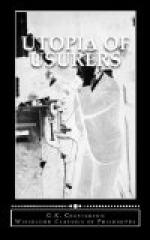In the last resort the two things called Beer and Soap end only in a froth. They are both below the high notice of a real religion. But there is just this difference: that the soap makes the factory more satisfactory, while the beer only makes the workman more satisfied. Wait and see if the Soap does not increase and the Beer decrease. Wait and see whether the religion of the Servile State is not in every case what I say: the encouragement of small virtues supporting capitalism, the discouragement of the huge virtues that defy it. Many great religions, Pagan and Christian, have insisted on wine. Only one, I think, has insisted on Soap. You will find it in the New Testament attributed to the Pharisees.
VI. SCIENCE AND THE EUGENISTS
The key fact in the new development of plutocracy is that it will use its own blunder as an excuse for further crimes. Everywhere the very completeness of the impoverishment will be made a reason for the enslavement; though the men who impoverished were the same who enslaved. It is as if a highwayman not only took away a gentleman’s horse and all his money, but then handed him over to the police for tramping without visible means of subsistence. And the most monstrous feature in this enormous meanness may be noted in the plutocratic appeal to science, or, rather, to the pseudo-science that they call Eugenics.
The Eugenists get the ear of the humane but rather hazy cliques by saying that the present “conditions” under which people work and breed are bad for the race; but the modern mind will not generally stretch beyond one step of reasoning, and the consequence which appears to follow on the consideration of these “conditions” is by no means what would originally have been expected. If somebody says: “A rickety cradle may mean a rickety baby,” the natural deduction, one would think, would be to give the people a good cradle, or give them money enough to buy one. But that means higher wages and greater equalisation of wealth; and the plutocratic scientist, with a slightly troubled expression, turns his eyes and pince-nez in another direction. Reduced to brutal terms of truth, his difficulty is this and simply this: More food, leisure, and money for the workman would mean a better workman, better even from the point of view of anyone for whom he worked. But more food, leisure, and money would also mean a more independent workman. A house with a decent fire and a full pantry would be a better house to make a chair or mend a clock in, even from the customer’s point of view, than a hovel with a leaky roof and a cold hearth. But a house with a decent fire and a full pantry would also be a better house in which to refuse to make a chair or mend a clock—a much better house to do nothing in—and doing nothing is sometimes one of the highest of the duties of man. All but the hard-hearted must be torn with pity for this pathetic dilemma of the rich man, who has to keep the poor man just stout enough to do the work and just thin enough to have to do it. As he stood gazing at the leaky roof and the rickety cradle in a pensive manner, there one day came into his mind a new and curious idea—one of the most strange, simple, and horrible ideas that have ever risen from the deep pit of original sin.




